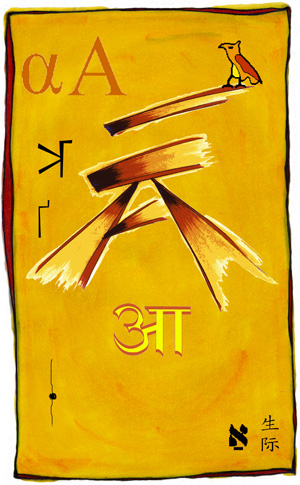
|
A Websters: 1 a) the first letter of the English alphabet, b) the tone A, d) someone or something arbitrarily or conveniently designated 'a', esp. as the first in order or class e1) a grade ...excellent, best, first, or superior f ) in the expression "from A to Z" indicating the beginning 2 ME, fr. OE an, one 3 (chiefly dialectic): a) on, in, at, to (might get married a Christmas) b) in to or for, each, for, every (twice a week) 4 (chiefly dialectic): he, him, she, her, they, them 5 have (could-a, might-a, God-a) 6 of (get out-a my... kind-a, sort-a, couple-a) 7 aw, ALL chiefly Scot. 9 at @ 1a) prefix on, in , at (abed, afoot, asunder) b) at such a time (a-nite) c) in such a state (a-fire) d) in such a manner (aloud) c) in the act of, process of (daddy's gone a-hunting) (the ship was still a-building) 2 (a or an) not, without
The New Shorter Oxford English Dictionary: the first letter of the modern English alphabet and of the ancient Roman one, corresponding to Greek alpha, Hebrew aleph. The sound originally represented by the letter, in English as in Latin, was a low back vowel, articulated with the tongue as low as possible in the mouth, considerable separation of the jaws, and spreading of the lips. I (a per se) the first, best, or unique person or thing II (symbolical) a) 4) The sixth note of the diatonic scale of C major, or the first of the relative minor scale of C 5) (logic) A universal affirmative proposition 6) The first hypothetical person or example 7) (math) The first known quantity (example for Websters 4 above): Tennyson: Doctors, they knaws nowt, for a says what's nawways true. I 1a) One, some, any b) One like 2)( before quantifiers): some, a matter of, about, (a few, a great many) 3a) a certain, a particular, b) a single, the same II 4) In, to, or for, each (Orig. the prep. a, OE an, on, defining time, as in twice a day; afterwards identified with the indef. article, and extended from time to space, measure, weight, number) III 1)(preposition) 1) (position or direction) on, on to, at, in, towards 2) (partition) in, into 3) (time) in, on, by 4) (manner) in, with 5) (capacity) in (someone's name) 6) (state) in 7) (process) in course of, undergoing "When the arc was a preparing" 8) (action) a) engaged in "Robert Burton: He would burst out a laughing" b) to, into "Such persons rarely go a begging." 2) of as cuppa, kinda, loadsa, lotsa, lotta IV. (prefix) 1) away, on, up, out, as abide, arise 2) of, off, from, 4) sense of motion to, change into, addition or intensification, as abandon, alarm, amass, avenue 5) off, away, from, as abridge 6) out, utterly as abash 7) reduced form of ad 8) reduced form of ab 9) used before a consonant for an- without, not, as abyss, apetalous A Dictionary of Pāḷi a 1) the letter or sound 'a' 3) (prefix) having a negative or privative or contrary sense 5) the augment (sign of action in the past) prefixed to the root in aor. and cond. tensess; occasionally placed before the preverb 7) a name of Visnu aa 2 a) as prefix expresses: diminution or intensity or completeness Pāḷi English Dictionary a 2 (Vedic a-, an-; Idg an; Latin en-, in-; Gothic, Old High German and Anglo Saxon: un-; Old Irish an-, in-) (negative particle prefixed to nouns and adjectives, or used like same) In meaning it equals na-, nir- and vi. Often we find it opp to sa-. aa 1 "a frequent prefix, used as well-defined simple base-prefix (with root-derivations), but not as modification (i.e. first part of a double prefix cpd. like sam-aa-dhi) . . . It denotes either touch (contact) or a personal (close) relation to the object) . . . or the aim of the action expressed in the verb a) (prep) up to, until, about, near; forth, out, to, towards, at, on a1) aim in general or touch in particular, aaka.d.dhati pull to, along or up, aakaasa shining forth, aagacchati go towards, aacamati rinse over aaneti bring towards, ad-duce; aabhaa shining forth; aabhujati bend in; aamasati touch at; aajata stretched out; aarabhati at-tempt; aarohana a-scending; aalaya hanging on; aaloketi look at; aavattati ad-vert; aavahati bring to; aavaasa dwelling at; aasaadeti touch; aasiidati sit by; aahanati strike at 1b) in reflexive functions, close relations to subject or person actively concerned, e.g. aadaati take on or up (to oneself); aadaasa looking at, mirror; aadhaara support; aanandati rejoice; aanisa.nsa subjective gain; aabaadha being affected; aamodita pleased; aarakkha guarding; aaraadhita satisfied; aaraama (personal) delight in; aalingati embrace (to oneself); aahaara taking to (oneself) 1c in transitive function; close relation to the object passively concerned, aaghaatana killing; aacarati indulge in; aacikkhati point out, explain; aajiiva living on; aa.naapeti give an order to somebody; aadisati point out to some one; aabhindati cut; aamanteti ad-dress; aayaacati pray to; aaroceti speak to; si~ncati besprinkle; aasevati indulge in 1d) out of meaning 1a develops that of an intensive-frequentative prefix in sense of "all-round, completely, very much" e.g. aaki.n.na strewn all over; aakula mixed up; aadhuta moved about; aaraava shouting out or very much; aalu.lati move about; aahi.n.dati roam about 2. Affinities. Closely relatedin meaning and often interchanging are the follow prep. (prefixes): anu (-bhati), abhi (-sa.nsati), pa (-tapati) pa.ti (-kankhati) in meaning 1a-c; and vi (-kirati, -ghaata, -cameti, -lepa, -lopa), sam (-tapati, -dassati) in meaning 1d 3. Combinations a) intensifying combinations of other modifying prefixes with aa as base: anu + aa (anvaa-gacchati, -disti, -maddati - rohati, -visati, -sanna, -hata), pa.ti + aa (paccaa-janati, -ttharati, -daati, -savati), pari + aa |
